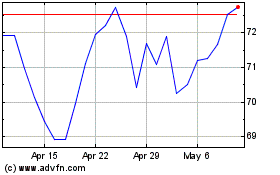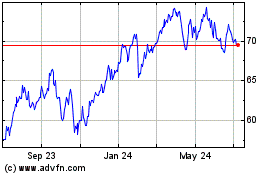By Ryan Tracy and Leslie Scism
WASHINGTON -- A judge who overruled the Obama administration's
assertion of federal oversight of MetLife Inc. castigated the
government for the way it reached its decision and broadly called
into question the process it used to bring large insurers under the
Federal Reserve's thumb.
U.S. District Judge Rosemary Collyer, who last week overturned
regulators' determination that distress at MetLife could put the
economy at risk, Thursday unsealed her written opinion in the
case
She took regulators to task for what she called an
"unreasonable" decision that didn't consider potential costs and
relied on a process she said was "fatally flawed."
Judge Collyer said the government's findings included
assumptions that weren't backed up by analysis of potential losses
at MetLife and its counterparties. "Every possible effect of
MetLife's imminent insolvency was summarily deemed grave enough to
damage the economy," she wrote.
A spokesman for Treasury Secretary Jacob Lew, who heads the
Financial Stability Oversight Council that made the MetLife
determination, said late Thursday the administration would appeal
the judge's ruling.
The findings by Judge Collyer amount to a broadside against one
of the core fixes the Obama administration and Congress enacted in
response to the 2008 financial crisis, when financial institutions
that weren't subject to strict federal oversight put the economy at
risk. Her opinion contradicts some of the top financial regulators
who populate the FSOC and sets up a legal battle that will
determine whether they continue to supervise some of the largest
U.S. insurance companies.
Some observers don't expect the decision to survive an appeal.
"I think the judge fundamentally misunderstands what the FSOC is
required to do," said University of Michigan law professor Michael
Barr, a former architect of the U.S. law that provided regulators
with the authority to label firms as systemically important.
Others said the ruling may not be so dire and still allows U.S.
regulators to redo their work and once again subject MetLife to
federal oversight. The reason: Judge Collyer faulted the oversight
council's process rather than its overall findings.
"We believe the court has left the door open for the Financial
Stability Oversight Council to redesignate MetLife as a
systemically important financial institution, though the process
may be more time-consuming and complicated," Guggenheim Securities
analyst Jaret Seiberg wrote in a note to clients Thursday.
Regulators also could use the decision as a sort of road map to
defend their systemically important designations of MetLife rivals
American International Group Inc. and Prudential Financial Inc.
during annual reviews, some legal experts said. Thomas Vartanian, a
partner with law firm Dechert LLP who helped author a brief in the
case supportive of MetLife, said the oversight council "will now
have to present compelling empirical arguments to support any
future designations."
Those factors may have helped push down shares of the big
insurers Thursday beyond the overall market. Shares of MetLife, AIG
and Prudential all declined on Thursday. Prudential and MetLife
dropped 2.5%, while AIG was down 1.8%, versus a 1% decline for the
broader market.
AIG and Prudential declined to comment Thursday, but people
familiar with the matter have said the firms are expected to review
the MetLife case and consider their own legal challenges.
MetLife, which received the SIFI label by a 9-1 vote of the
council in December 2014, is the only firm to challenge regulators'
decision in court so far. But it is possible AIG and Prudential
could follow with their own lawsuits if MetLife is ultimately
successful, undoing one of the Obama administration's key
post-financial crisis regulatory accomplishments.
"We remain pleased with the U.S. district court's decision," a
spokesman for MetLife said.
Mr. Lew said the council wouldn't back down as a result of the
judge's ruling. In a statement, he said: "We intend to continue
defending vigorously the process and the integrity of FSOC's work
and I am confident that we will prevail....This decision leaves one
of the largest and most highly interconnected financial companies
in the world subject to even less oversight than before the
financial crisis."
The oversight council also includes the heads of the Federal
Reserve, Securities and Exchange Commission and other
regulators.
The 2010 Dodd-Frank financial-overhaul law gave the council
authority to designate firms as systemically important if their
failure or activities could threaten financial stability.
That label comes with tougher oversight from the Fed, including
annual "stress tests" and limits on borrowing that are expected to
go beyond those applied to other insurance companies, which are
primarily regulated by the states.
In designating MetLife, regulators outlined a range of risks
associated with the firm and described how, if the firm got in
trouble, stress could spread quickly to other parts of the
economy.
But in her 33-page ruling, Judge Collyer said the council made
promises that regulators later abandoned without explanation,
violating administrative law and rendering its decision arbitrary
and capricious.
Specifically, she said FSOC had promised to assess MetLife's
vulnerability to financial distress but didn't do so and that it
changed its definition of what it means to threaten the financial
stability of the U.S.
The oversight council has argued it didn't depart from its
initial promises and was only required to assess the impact of
MetLife's failure, not the likelihood of it.
Mr. Lew said in his statement that "the financial crisis showed
direct and predictable counterparty losses are not often the means
by which the failure of a financial company could destabilize
markets and threaten the U.S. economy."
Judge Collyer also invoked a June 2015 Supreme Court decision on
regulatory cost-benefit analysis, known as Michigan v.
Environmental Protection Agency. The decision, written by the late
Justice Antonin Scalia -- whose son Eugene is a partner at Gibson,
Dunn & Crutcher LLP representing MetLife -- found the EPA acted
unreasonably when it didn't consider cost in making a regulatory
decision.
"Because FSOC refused to consider costs as part of its calculus,
it is impossible to know whether its designation 'does
significantly more harm than good,'" Judge Collyer wrote, quoting
the Michigan decision.
Mr. Lew said Congress chose not to require the FSOC to conduct a
formal cost-benefit analysis "for good reasons" because doing so
would impair regulators' ability to address risk. He said crises
are difficult to predict, but their damage can be far-reaching.
Write to Ryan Tracy at ryan.tracy@wsj.com
(END) Dow Jones Newswires
April 08, 2016 10:51 ET (14:51 GMT)
Copyright (c) 2016 Dow Jones & Company, Inc.
MetLife (NYSE:MET)
Historical Stock Chart
From Mar 2024 to Apr 2024

MetLife (NYSE:MET)
Historical Stock Chart
From Apr 2023 to Apr 2024
